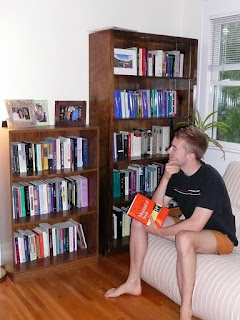Reflections on a Decade of Teaching
(Joel in 2007. . . and in 2017)
When I entered the classroom
in Duke’s Perkins Library for the beginning of my first ever course, I had a
flutter of nervousness just like when I would mount the stage at one of my many
piano recitals – a sudden lightness in my stomach as my hands began to
perspire. But when I saw the students sitting around the long seminar table,
another feeling immediately overtook the first: gratitude. Look at these
interesting people all eager to learn something! And I’m the professor! I can’t
believe this is my job.
Forming that first class
were students from Canada, China, Kazakstan, and the United States. I had
students from north and south, east and west. I had a high school student, a
senior who only needed these credits to graduate, and a midcareer public
servant completing his policy degree. And we all assembled to study political
philosophy.
I remember that I introduced
myself and asked the students to introduce one another. Then I leapt in: What
is the good life? This was the question posed to me not quite eight years
before in my own Introduction to Political Philosophy course, freshman year of
college. It was the question that had kept me studying political philosophy ever
since. And it was the question around which I had now designed the present
course. I wanted the students to feel the urgency of the question – how are we to live? – as well as
encounter some of the ways thinkers had addressed it.
To take up this question in
a new way, I proposed a simulation. I passed out slips of paper with roles for
students to play. Each one had a name and a few basic ideas. “Iggy” was Kant.
“Fritz” was Nietzsche. I had them read the description of their role and
imagine themselves in that mindset. Assuming this role, how would your
character choose to live? How would they organize collective life? When I asked
them to begin, the room fell silent. It was like that pause when the pianist
sits at the keyboard, fingers poised and the audience holds its breath. A beat.
And then we were off – an excited, energetic discussion that brought all of us
into the conversation of political philosophy and created a tenor for all of
our work during the next seven weeks. It was a delight.
Teaching has been an
education for me. I’ve learned just how precious and fragile the space of the
classroom is. If I am lucky and play my own role just right, I can hold a space
for wondrous things to arise: trust and friendship among all participants;
understanding not just of material but of what we bring to the material and why;
a sense of community and just how much we can accomplish together. I say this
is precious and fragile because in my decade of teaching I’ve encountered the
difficulty of preserving this space. Often success has been outside of my
control. But I have learned to focus most on listening and building relationships
with students; the rest usually follows.
I’ve not taught the intro
course much in the last few years, but I remember another moment of happiness
and insight when I was teaching it at Carleton. The class numbered fewer than a
dozen students and for our last meeting we decided to gather at a waffle shop
on the Main Street of Northfield, a few blocks from campus. It was late morning
and we were the only people inside, but the lively discussion of Alexis de
Tocqueville’s Democracy in America filled
the restaurant. We veered from American popular culture to that year’s
Presidential election (this was in 2008) to the existence of God. Even when we
detoured from the text or the “rigor” of political philosophy, it was a
conversation that mattered. Everyone was leaning in.
It did not occur to me then
but I see now how this moment illustrated one of the greatest joys of teaching
and one of its most important practices: to learn to craft conversation that
can change us; to develop a taste for real talk that responds to what each of
us needs or longs to hear; to live in the present with all of your senses,
intuitions, and powers of reflection turned on. This is what I experienced that
first day of teaching over a decade ago as well as that morning in the waffle
shop. And that’s what I’m after when I go back to the classroom again and
again, year after year.

